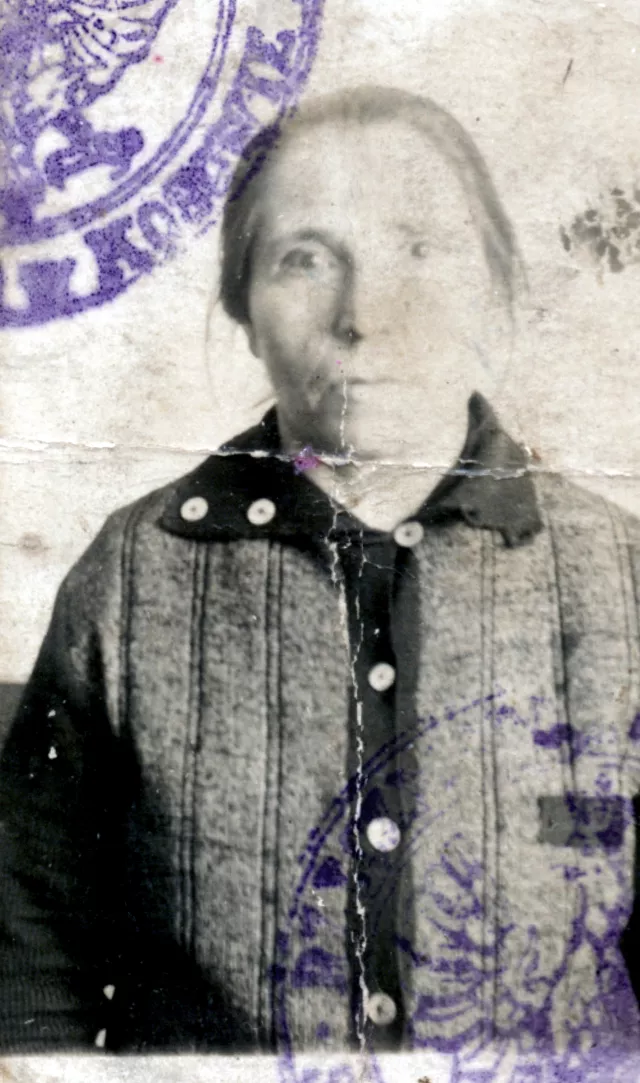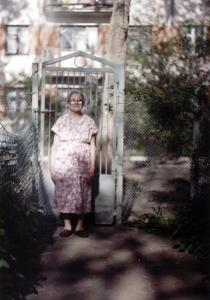This is a picture of my mother Leya Ostrover, nee Schwarg. The photo was taken for her identity card in Kosov in 1935. My sister and I found this photo in our parents' house in Pistyn that was robbed.
My mother was born in the town Bobrka near Lvov in 1877. Her parents died when she was young and she had to work from an early age. She told me that she even was a laborer in a church for some time before she came to work for a Ukrainian family. My mother said that this family treated her nicely. She lived with them for several years. [Editor's note: Makhlia cannot explain how a Jewish girl came to serve in a Ukrainian family when it was more common that Jewish girls worked for Jewish families.] She did the hardest work in the house and lived in a storeroom and the family wasn't interested in her outlooks. My mother was smart and she learned to read and write from teachers that came to teach the Ukrainian children. She also had some knowledge of French and German. She was eager to study and always stayed in the room during classes. She ate what she was given and during Jewish holidays she was allowed to go to Jewish families that observed the kashrut and Jewish traditions.
When my father was 22 he went to the small town of Bobrka on business. Ant there he met this 17-year old Jewish girl who worked as a nanny for a wealthy Ukrainian family: my mother. She was very pretty and my father liked her a lot. My father knew that his mother would never give her consent to this marriage since the girl came from a poor family and had no dowry. My father kept visiting her in secret. He arranged for a wedding to be conducted by a local rabbi. He needed money for the wedding, which he took from his mother without telling her. My parents had a traditional Jewish wedding with a chuppah. When my father brought his wife home his mother just said, 'You've married her - now live with her where you want and how you want'. She disinherited her son and never again took any interest in him and his family. In 1894 my mother and father settled down in the village of Pistyn near Kosov, 150 kilometers from Lvov.
My mother was a great cook. She bred chickens and took them to the shochet that lived near the synagogue. She only cooked chickens slaughtered by the shochet. Beef became kosher meat only after it was checked by the rabbi. My mother made chicken broth and meat balls from beef. Sometimes she added kolble and sometimes dumplings into chicken broth. On Friday mother made challah. She plaited them very skillfully like no one else. She also made 'Magdeburg pudding' from ground potatoes and she baked pies with nuts and honey and strudels with apples. My mother also made lokshen, very thin noodles. My mother cooked in ceramic pots on a wood stoked stove with an oven that had a tin lid. We ate food with wooden spoons.
In September 1941 the Germans came to the village. On 16-17 October 1941 they captured almost half of the Jewish community of the village to take them to execution in the vicinity of the village. Our father, mother and Idlei hid in the cellar. A 'bukharka' - slang for 'drunkard' - Galia, a local Ukrainian, saw them and began to shout, calling the Germans to 'come here immediately: there is a 'zhydivka' hiding'. The Germans pulled my mother outside by her hair and my father by his beard. Idlei was running after them yelling in Yiddish, 'Don't touch my mother or I will kill you', but the Germans only laughed at him. When they reached the shooting ground the Germans forced my father to bury those Jews that had been shot there. I'm still terrified to think what my father must have felt while burying his Jewish neighbors and acquaintances. Then the Germans put my father, mother and handicapped Idlei into a gas chamber truck and left the truck somewhere. When they were dead, their bodies were thrown out some place - nobody knows where.
Leya Ostrover
The Centropa Collection at USHMM
The Centropa archive has been acquired by the United States Holocaust Memorial Museum in Washington, DC.
USHMM will soon offer a Special Collections page for Centropa.
Academics please note: USHMM can provide you with original language word-for-word transcripts and high resolution photographs. All publications should be credited: "From the Centropa Collection at the United States Memorial Museum in Washington, DC". Please contact collection [at] centropa.org.











